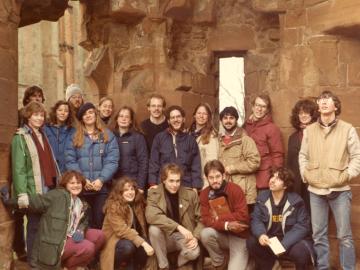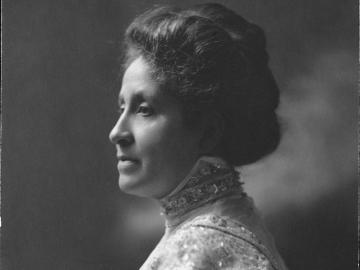Oberlin Alumni Magazine
Fancy Footwork
April 1, 2024
Emma Silvers

Ted Gradman ’81 vividly remembers the first time he set foot on the ice.
It was the summer of 1969, and Gradman was 11 years old. He and his sister Janet had ridden their bikes from their small New Jersey suburb to a neighboring town, looking for something to do to cool off, and came upon an indoor ice rink. Gradman was short for his age, and he’d always struggled in gym class. But as soon as he stepped onto the ice in his rented skates, he had a revelation.
“It just fit,” he says, still lighting up at the memory. “In gym, I couldn’t do pull-ups, and I was always the last to finish obstacle courses. But on the ice, I was somehow coordinated. It was tremendous fun!”
More than 50 years later, Gradman still gets excited when he talks about the sport. He’s snacking on goji berries after an early Tuesday morning skate at the Yerba Buena Skating Center in downtown San Francisco, where he practices at least three times a week—and is something of a local celebrity. On this particular morning, both before and after he skates to music from Amélie, Gradman has brief, friendly chats with just about everybody in the rink.
He’s not just here for a little light cardio. Figure skating is the central passion in Gradman’s life alongside his successful career as a psychologist and his 30-year marriage. At 65, he is one of seven people who have participated in every single U.S. Adult Figure Skating Championships event since the competition debuted in 1995, making him a member of an increasingly exclusive club of “lifers.”
Gradman has saved souvenirs from every event, such as “tossies”—a colloquial term for small stuffed animals and tchotchkes that fans and supporters throw onto the ice after a performance.
He also loves a challenge. At an age when most figure skaters have hung up their blades, Gradman performs routines that include fancy footwork, spins, axels, and single jumps like salchows. And he wins accolades for them:
At the April 2023 championships in Salt Lake City, Gradman landed one of his best axels, scoring a +1 grade of execution (GOE) in the 22-64 age division championship round and even squeaked out a bronze medal while competing as the oldest person in the 46-65 age division. A few weeks later, he received his Medicare card.
Like clockwork, Gradman will be in the mix once again at this year’s championships, taking place April 3-6 at the Serpentini Arena Winterhurst rink in Lakewood, Ohio, roughly 40 minutes away from a place that still means a lot to him.
Gradman didn’t choose Oberlin College, he says; it chose him. He’d considered the University of Pennsylvania and Wesleyan, but after sitting in on an Oberlin choreography class that was like nothing he’d ever seen before—he recalls the instructor performing an intricate, thought-provoking piece involving rhythmic movements in a giant, bright-white pillowcase and a last-minute dramatic arm movement—he knew he had found his place. “‘Obies are so spirited, inventive, and exuberant,’” he remembers thinking.

He has fond memories of living in Shurtleff Cottage and dining in Oberlin’s various co-ops, starting with the Kosher Halal Co-op during his first year. “I strolled across the street from Talcott to the conservatory almost every night for dessert—some kind of delicious concert— before heading to the library to study,” Gradman recalls. “It was heaven.” Gradman spent the next few years living and dining in the vegetarian Harkness and Fairchild co-ops. His time in the former was particularly “wild,” he remembers—the smell of pot mingling with the scent of fresh bread baking in the kitchen, or the time the second floor flooded because too many people crammed into the mixed-gender shower.
Perhaps even more important: Oberlin had an ice rink. Before he started in the fall of 1976, Gradman was measured for a pair of custom skates by George Stanzione, an old-world Italian bootmaker in New York City. Months later, he received a slip of paper informing him he had a package in the mail room—mailbox 1212, he recalls. “I was just jubilant. It was so thrilling. And they fit right away.”
Oberlin’s outdoor rink was only open in the winter and boasted a curved, snow-repelling roof. It was located in what’s now the enclosed artificial turf field house, part of Knowlton Athletic Complex—but in those days, the wind got in. Gradman remembers piling on layers to skate and freezing anyway, but it was always worth it. Huddled in the little warming area, he made lifelong friends. And the skating itself was like nothing else.
“When you get on the ice, there’s no friction. You push, and then you fly,” says Gradman. “Where else can you do that?”
In the years since he graduated from Oberlin with a degree in English, Gradman has continued to find solace, joy, and community on the ice. He kept skating after moving to Berkeley, California—the Zamboni family had a rink nearby—and he found a new home at the Culver City rink in Los Angeles while he earned his PhD in clinical psychology at UCLA; he remembers midnight skating sessions as an escape from his studies. Gradman continued skating in Cupertino after moving back to the Bay Area in 1989 for postdoctoral work, and he eventually started a private practice after working as a neuropsychologist in a stroke rehabilitation unit. Today, he’s an in-demand therapist specializing in cognitive behavioral therapy for anxiety disorders.

Skating Championships.
Gradman decided to sign up for his first adult competition in 1990 at the urging of a Bay Area skating friend. In those early years, he shared the ice with up-and-coming greats like Michelle Kwan, Jenni Meno, Todd Sand, and Rudy Galindo. Gradman remembers being in the “nosebleeds” while Galindo won the gold medal at a national competition in 1993. “And then I was on the same ice training with him!” he says. “Of course, he was doing triple jumps, and I was starting to work on doubles.”
In 1994, another skating friend changed his life in a different way, urging him to go on a blind date with a smart, funny pediatric gastroenterologist named Hilary Perr. The pair went tidepooling on the coast, then went to a coffee shop and talked over knishes; he read her poetry by William Carlos Williams. Five weeks later, the couple were engaged.
Perr says she saw from the start how important skating was to Gradman. But there was a bit of a learning curve: A couple weeks into dating, she went to see him in a competi- tion and, not realizing it would be cold at the ice rink, wore shorts. “I was also under the misconception that it was a dignified sport,” she says with a laugh. “You watch tennis matches on TV, and it’s hushed, and there’s a proper way to behave. But I was shocked to see that people were shouting things while ice skaters performed.”
Prompted by Gradman’s best friend to join in, Perr recalls she yelled out the first thing she could think of—a saucy compliment about her now-husband’s behind.
Indeed, the rowdy spirit of the sport is part of what has kept Gradman hooked for so long—he refers to the mood at championships as “a giant PJ party.” It helps that whimsical costumes and musical choices are encouraged: In 2021 alone, Gradman skated to music from the 2008 animated film Kung Fu Panda for his technical program (with a little Chopin at the end) and to Scott McKenzie’s "San Francisco (Be Sure to Wear Flowers in Your Hair)" for the interpretive program—the latter while dressed in full-on hippie garb from Haight-Ashbury.
He says the adult skating world possesses a strong sense of camaraderie and is generally very supportive. (That extends to many Obies: Over the years, Gradman’s been cheered on by Christel Mann ’82, Lauren Ungar ’81, Eleanor Piez ’82, Peter Bishop ’81, Chris Wolf-Gould ’81, David Forman ’82, and Ellen Sande ’77.) But despite the levity, participants at these competitions are serious, committed athletes—and Gradman means business even when he’s dressed a bit silly.

Alexei Folger, a San Francisco skater who’s attended several championships with Gradman, recalls a time Gradman skated through an injury as “one of the most amazing skating moments I’ve ever seen.” It was 2003, and they were at a qualifying competition to get to nationals. Because there were so few men in Gradman’s category, all he had to do to qualify was skate at all. During practice, Gradman and another skater collided, and Gradman wound up snapping his fibula—an injury that would have sent most skaters home.
“But because Ted was determined to go to nationals, when his event came, he put on his full costume; they played his regular program music; and he went out there and did the most amazing footwork sequence I’ve ever seen—on one foot,” Folger recalls. The crowd, mostly fellow adult skaters and their friends, went wild. He hopped off the ice to a rousing ovation that day, did serious rehab—and went on to compete at nationals, placing ninth in his category that year.
These days, Gradman says he’s mostly competing with himself. Skating requires intense mental fortitude—and, on the best days, an almost spiritual element as well. “I'm not all that focused on medals per se,” Gradman says. “Figure skating is an enticing amalgam of sport, art, slippery challenge, gravity defiance, connection to the universe and performance vehicle ... I’ve had moments of elation on the ice that I don’t get anywhere else.”
His wife has learned that Gradman isn’t alone in that feeling—or in his determination to keep going no matter what. “The group of skaters who do this as adults is pretty extraor- dinary,” says Perr, who notes that she has found ways to get involved over the years, including by making Gradman’s costumes or by throwing toy ducks on the ice, a reference to one of the couple’s inside jokes. “I’ve seen people keep going despite tremendous adversity—whether health circumstances, or they live two hours away, or can’t afford the skates or the lessons. But they still figure out ways to keep doing it.”
“They fall, but they always get up,” she continues. “If that isn’t a metaphor for life, I don’t know what is.”
In Gradman’s case, he plans to keep getting back up as long as his body lets him. And when he can’t do the jumps and spins anymore, he’ll transition into ice dancing. Believe it or not, he has role models—like 84-year-old Connie Currie, the oldest skater participating at 2023’s national championships.
“I’ve only been skating for 55 years,” Gradman says with a grin. “I’m still a beginner.”
Gradman will be participating in the 2024 U.S. Adult Figure Skating Championships, held at the Serpentini Arena Winterhurst rink in Lakewood, Ohio, from April 3-6, 2024. He'll be competing on the following dates/times: April 3 (7:10—7:25 PM; Masters Lyrical Pop/Character/Comedic IV/V; Sheet 2); April 5 (4 PM—4:30 PM; Masters Intermediate-Novice Men III/IV; Sheet 1); and April 6 (4-5:15 PM; Championship Masters Intermediate-Novice Men; Sheet 1). All competitions will be streamed live on U.S. Figure Skating’s YouTube channel.
This story originally appeared in the Winter/Spring 2024 issue of the Oberlin Alumni Magazine.
Tags:
You may also like…
Voices Carry
March 13, 2025
Grammy-certified vocalist and viola da gamba player Ari Mason ’14 finds her niche in video games, films, and a vocal library.
London Calling
March 13, 2025
For Tracy Chevalier ’84, the Oberlin-In-London program was a magical, intense period of cultural and intellectual stimulation. As the beloved study-away experience celebrates 50 years, the New York Times best-selling author looks back on the semester she spent studying and living in London.
A Banner Held High
February 26, 2025
In 2018, Oberlin College named its main library after civil rights leader Mary Church Terrell, Class of 1884.


